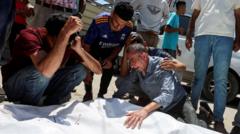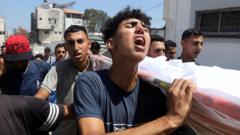The recent $30 million funding approval from the U.S. for the Gaza Humanitarian Foundation has sparked backlash from humanitarian groups and the United Nations, citing significant risks for the Palestinian population involved.
U.S. Allocates $30 Million to Controversial Gaza Aid Initiative

U.S. Allocates $30 Million to Controversial Gaza Aid Initiative
The Gaza Humanitarian Foundation faces scrutiny from humanitarian entities despite U.S. support.
In a recent statement, the U.S. State Department announced a $30 million funding initiative aimed at enhancing the operational capabilities of the Gaza Humanitarian Foundation, an entity backed by Israel and predominantly managed by American contractors. This funding comes amid rising tensions and incidents of violence near the distribution sites in Gaza. Thomas Pigott, a spokesperson for the State Department, championed the foundation’s efforts during a news briefing, urging other nations to contribute, despite criticisms directed at the humanitarian group from various quarters.
Since its inception late last month, the Gaza Humanitarian Foundation's operations have been marred by critical challenges. The limited number of aid distribution sites, primarily situated in southern Gaza with the presence of Israeli military forces, has fueled concerns over the safety of civilians seeking assistance. Humanitarian organizations have expressed apprehension that this situation could lead to the militarization of aid efforts, leaving many residents vulnerable in an already precarious environment.
Reports of violence around these aid distribution points underscore the tensions present in the region. According to the Gaza health ministry, at least hundreds have tragically lost their lives in the recent month due to confrontations at these centers. Eyewitness accounts often detail instances where Israeli forces have reportedly fired warning shots as crowds approached, creating an atmosphere of fear and uncertainty for those dependent on the aid.
The situation raises pressing questions about the efficacy and safety of humanitarian assistance in conflict zones, particularly within the context of Israeli-Palestinian relations. The implications of this financial boost from the U.S. government will need to be carefully monitored as the situation evolves, particularly with an increasing call for transparency and accountability from the international community.
Since its inception late last month, the Gaza Humanitarian Foundation's operations have been marred by critical challenges. The limited number of aid distribution sites, primarily situated in southern Gaza with the presence of Israeli military forces, has fueled concerns over the safety of civilians seeking assistance. Humanitarian organizations have expressed apprehension that this situation could lead to the militarization of aid efforts, leaving many residents vulnerable in an already precarious environment.
Reports of violence around these aid distribution points underscore the tensions present in the region. According to the Gaza health ministry, at least hundreds have tragically lost their lives in the recent month due to confrontations at these centers. Eyewitness accounts often detail instances where Israeli forces have reportedly fired warning shots as crowds approached, creating an atmosphere of fear and uncertainty for those dependent on the aid.
The situation raises pressing questions about the efficacy and safety of humanitarian assistance in conflict zones, particularly within the context of Israeli-Palestinian relations. The implications of this financial boost from the U.S. government will need to be carefully monitored as the situation evolves, particularly with an increasing call for transparency and accountability from the international community.




















